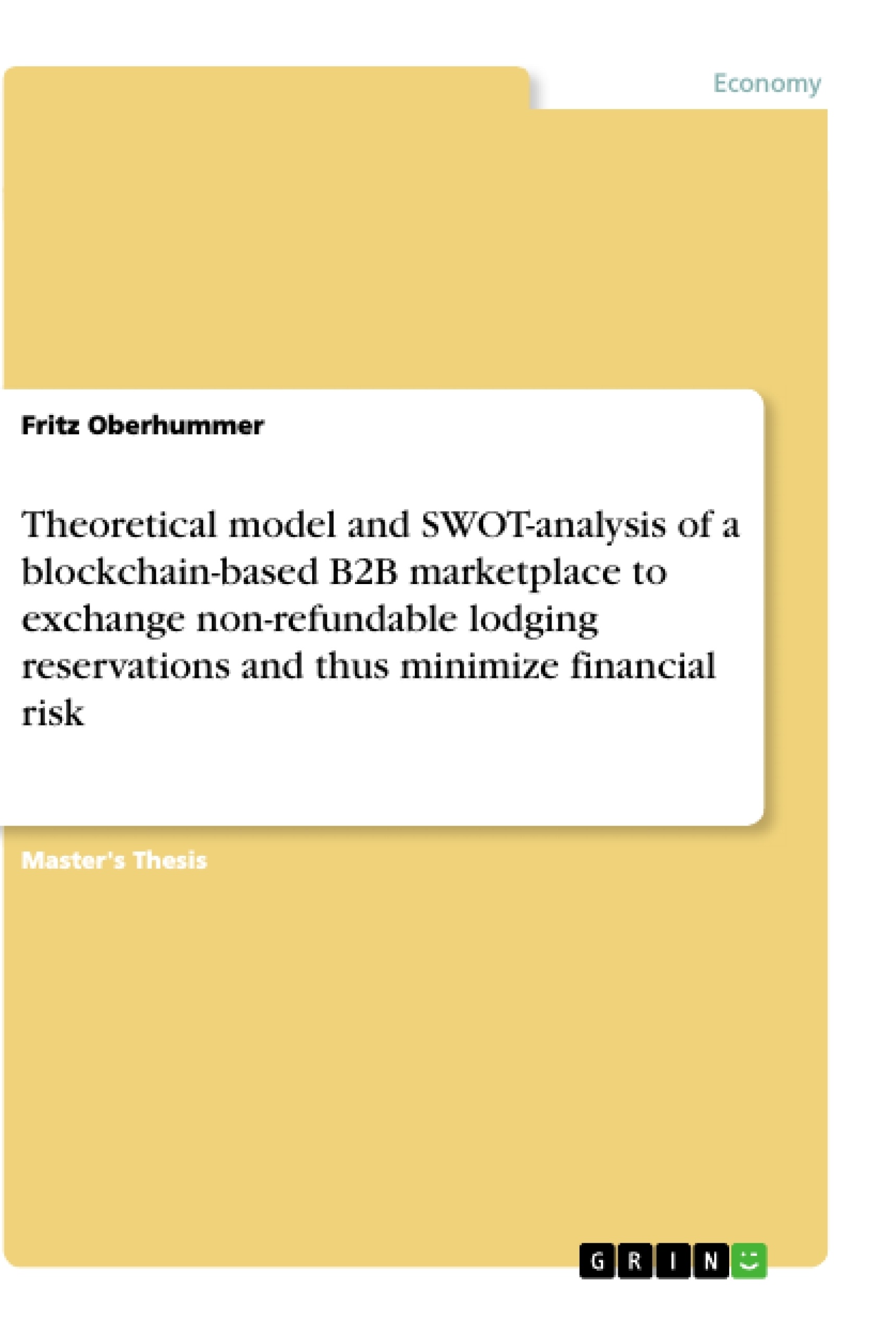The following master thesis paper explores the possibility of resolving a major issue of the travel industry around how (non-refundable) reservations on lodging properties could be exchanged in a B2B market place by using blockchain technology as the exchange layer.
To provide the reader with background knowledge first an introduction into definitions around B2B market spaces, the travel industry and blockchain are being made. Here the commercial structure of volume-related cost metrics of such B2B marketplaces are explained. This is then followed by quick introduction into the travel industry, its different distribution segments online (like OTAs) and offline (Retail) and the related suppliers and technology around them.
For a deeper understanding on the financial background operations the two different main billing models are explained: Merchant versus Agency. Whereas the Agency model primarily is based on the traveler settling the bill himself upon check-out, the Merchant model works on collecting money upfront from the traveler (with the effect of usually Merchant rates being cheaper than Agency rates). This further gets segmented into who takes the payment (supplier or B2B partner) and how the financial setup works in terms of payment guarantees, billing cycles and dispute handling.
Blockchain technology is explained in the next chapter, from its first known functionality as a pure cryptocurrency (Bitcoin) to the next step of technological evolution where the payments of those crypto currencies are then tied to a set of business rules called “smart contracts”, rooted in the Ethereum blockchain technology framework.
The first step of then building the theoretical model was an analysis of data to find out the addressable market size, which is roughly in an USD billion-dollar annual turnover range. This then was followed by setting up an according market place framework, supported by a set of technology requirements on blockchain operations in order to create a stable and clearly structured business environment.
Described steps here are the initial setup, the distribution of the “FO$” crypto coin, overall market place functionality where underwriters would guarantee stability of both used crypto and fiat currencies.
Based on this theoretical model a SWOT-analysis was then conducted, considering the various internal and external success and failure factors for this framework.
Inhaltsverzeichnis (Table of Contents)
- Executive Summary
- 1. Introduction
- 1.1. B2B Marketplaces
- 1.2. Travel Industry
- 1.3. Blockchain Technology
- 2. Building the Theoretical Model
- 2.1. Defining the Addressable Market
- 2.2. Market Place Framework
- 2.3. Technological Requirements
- 2.4. The FO$ Token and its Distribution
- 3. SWOT Analysis
- 3.1. Internal Strengths
- 3.2. Internal Weaknesses
- 3.3. External Opportunities
- 3.4. External Threats
- 4. Conclusion
Zielsetzung und Themenschwerpunkte (Objectives and Key Themes)
This master thesis explores the potential of a blockchain-based B2B marketplace for exchanging non-refundable lodging reservations in the travel industry. The goal is to analyze the feasibility of such a marketplace and assess its potential to minimize financial risk for both suppliers and buyers. The thesis aims to understand the functionality of this system, address market size and potential revenue streams, and conduct a thorough SWOT analysis to identify key strengths, weaknesses, opportunities, and threats.
- Exploring the application of blockchain technology in the B2B travel industry
- Analyzing the feasibility of a blockchain-based marketplace for exchanging non-refundable lodging reservations
- Developing a theoretical model for such a marketplace
- Assessing the potential benefits and risks of implementing such a system
- Conducting a SWOT analysis to understand the competitive landscape and future prospects
Zusammenfassung der Kapitel (Chapter Summaries)
- Executive Summary: Provides a concise overview of the thesis, highlighting the problem addressed, the methodology used, and the key findings.
- Chapter 1: Introduction: This chapter introduces the concepts of B2B marketplaces, the travel industry, and blockchain technology. It clarifies key definitions, explores the commercial structure of B2B marketplaces, and discusses different distribution segments and technology within the travel industry.
- Chapter 2: Building the Theoretical Model: This chapter delves into the theoretical model, starting with an analysis of the addressable market size. It describes the proposed marketplace framework, outlines technological requirements for blockchain operations, and details the distribution of the "FO$" crypto coin and its role within the ecosystem.
- Chapter 3: SWOT Analysis: This chapter conducts a comprehensive SWOT analysis, identifying internal strengths and weaknesses as well as external opportunities and threats related to the proposed blockchain-based marketplace. It explores aspects such as decentralization, security, legal considerations, and market positioning.
Schlüsselwörter (Keywords)
The core concepts of this thesis revolve around the intersection of the travel industry, B2B marketplaces, and blockchain technology. Key keywords include non-refundable reservations, lodging, blockchain, cryptocurrency, smart contracts, B2B exchange, SWOT analysis, market size, addressable market, and financial risk.
- Quote paper
- Fritz Oberhummer (Author), 2019, Theoretical model and SWOT-analysis of a blockchain-based B2B marketplace to exchange non-refundable lodging reservations and thus minimize financial risk, Munich, GRIN Verlag, https://www.grin.com/document/488811




